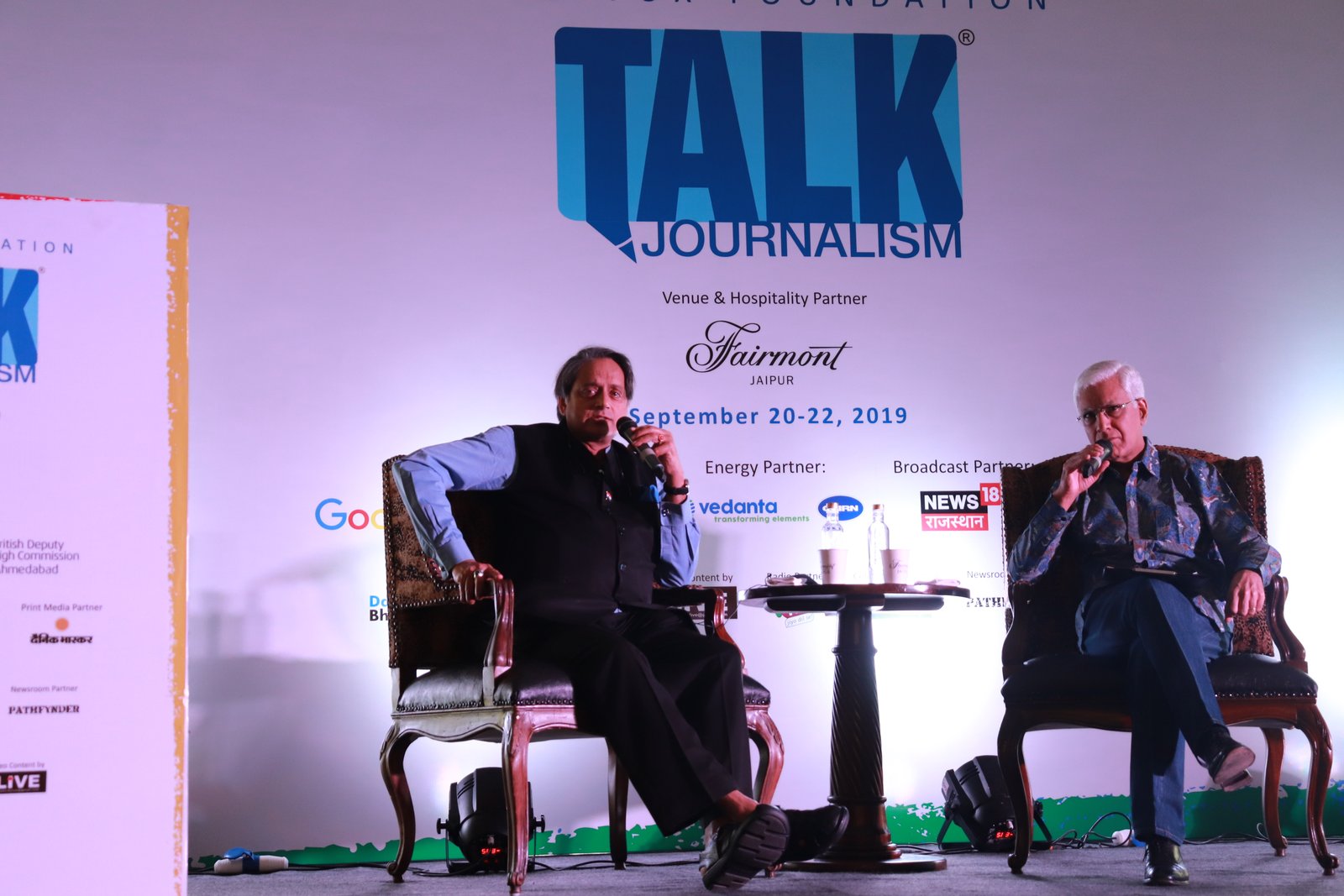Jaipur, 20 September 2019 – Under attack from his own party because of his recent comments, Shashi Tharoor advocated the need for dissent within the political parties. During the session on Shrinking Space for Dissent with journalist Karan Thapar on the inaugural day of Talk Journalism, there was an uncanny resemblance between him and the media as both are under attack for non-confirmatory opinions.
Both Thapar and Tharoor were on the same page about the media being heavily manipulated. Dr Tharoor talked about how the junior journalists have the impending pressure of their organizations’, their leaning, and the pressure of maintaining their jobs. It is quite consequential, that the journalists will do whatever the owner of the organization within which they function, compels them to do. He was saddened by the fact that journalists like Punya Prasun BajpayI, Barkha Dutt and Karan Thapar do not have their shows on TV anymore. The question is whether there is space for journalists, or for that matter people have a say against the government.
“We share this right with 1.2 billion people. And being asked to leave when we exercise this right..” Dr. Tharoor then lured into a disappointed murmur.
On Friday morning in Jaipur, Kerala MP Shashi Tharoor, claimed that he is trolled on social media like he is a “Casanova”. Much later it dawned upon him that trolling is a systematic process and ascribed the ruling party for the same.
In an informal conversation with Karan Thapar, Shashi Tharoor showed nuances that we did not know existed. Thapar pointed out as to how Indians lack a funny bone, “Dr Tharoor, do you think we are too intolerant and incapable of taking a joke?”
To this, the author and parliamentarian said that Indians do not lack a funny bone per se, but are just not good at mixing humor with politics. The audience had a good laugh when he aptly impersonated Gandhi’s amusing response to a British journalist when asked whether he was addressed properly by the emperor in London. Gandhi came back with, “Oh yes, His majesty wore enough clothes for the both of us!” Bapu, in his minimal and simplistic loin clothing, stroke the pose of a fakir even in the court of the emperor.
Apart from the humor, the discussion went on the lines of dissent, conformity, right to freedom of speech and expression and the fear of voices being curbed.
Both agreed that democracy must have space for critique and dissent. There should be space for party members to present a bill in the parliament backed by their personal opinion and after their consent. Poor MPs have to abide by the party leaders, no matter how much they beg to differ. Equally important is a space for general citizens’ complaints against the government and that a voice of dissent should not be considered anti-national.
Tharoor went back to 1962, wherein members of a party had the freedom to express their judgment, even if a difference of ideology existed. Atal Bihari Vajpayee went against his own party in Rajya Sabha. In the same year, Jawaharlal Nehru and Vajpayee had a cooperative discussion on the issue of China.
Right now, countries like the United States, the United Kingdom have similar political atmosphere. However, their media and the general public have not been falsified with manipulated messages from the government. Tharoor still has hope in the institution of judiciary, though recent developments in the courts have not been so democratic.
The audience raised their concerns that the opposition is not playing their role aptly. To which Dr. Tharoor defended himself by saying that it is the media which is supposed to portray the efforts of the opposition. However, the media is run by people who are funded by the government. Journalists do not want to reveal a lot of things at the stake of their jobs, their careers, their families.
Text: Sumbul Jahangeer & Pratyusha Roy Chowdhury | Copy edit: Rupali Soni| Photo: Sagar Samuel | Editorial coordination: Rupali Soni & Niharika Raina


